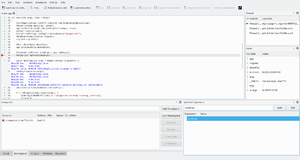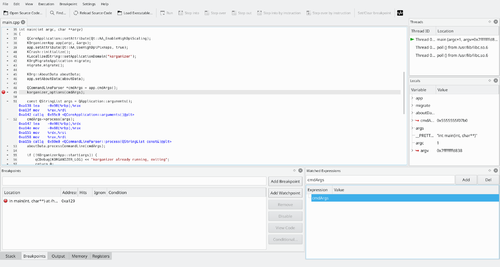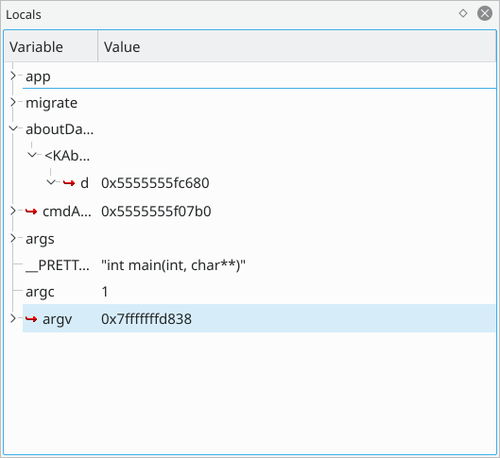KDbg/da: Difference between revisions
Appearance
No edit summary |
Created page with "* Inspektion af variables værdier i en træstruktur" |
||
| Line 10: | Line 10: | ||
[[Image:Kdbgtotal.png|center|500px|thumb|Kildekode, stoppunkter, lokale variable, overvågede udtryk og listen over tråde]] | [[Image:Kdbgtotal.png|center|500px|thumb|Kildekode, stoppunkter, lokale variable, overvågede udtryk og listen over tråde]] | ||
* | * Inspektion af variables værdier i en træstruktur | ||
* Direct member: For certain compound data types the most important member values are displayed next to the variable name, so that it is not necessary to expand the subtree of that variable in order to see the member value. For example, you don't need to go into a variable of type QString if you want to see the string that the variable holds. (BTW, this is of course not hardcoded, but can be extended to new types.) KDbg can even display Qt's QString values, which are Unicode strings. | * Direct member: For certain compound data types the most important member values are displayed next to the variable name, so that it is not necessary to expand the subtree of that variable in order to see the member value. For example, you don't need to go into a variable of type QString if you want to see the string that the variable holds. (BTW, this is of course not hardcoded, but can be extended to new types.) KDbg can even display Qt's QString values, which are Unicode strings. | ||
Revision as of 09:13, 10 April 2020
 |
KDbg er et grafisk værktøj til at fejlsøge dine programmer |
Hovedtræk

- Inspektion af variables værdier i en træstruktur
- Direct member: For certain compound data types the most important member values are displayed next to the variable name, so that it is not necessary to expand the subtree of that variable in order to see the member value. For example, you don't need to go into a variable of type QString if you want to see the string that the variable holds. (BTW, this is of course not hardcoded, but can be extended to new types.) KDbg can even display Qt's QString values, which are Unicode strings.
- Debugger at your finger tips: The basic debugger functions (step, next, run, finish, until, set/clear/enable/disable breakpoint) are bound to function keys F5 through F10. Quick and easy.
- Of course, lots of other basic functions: View source code, search text, set program arguments and environment variables, display arbitrary expressions. Everything you need to debug a program!
- Debugging of core dumps, attaching to running processes is possible.

Projektets hjemmeside giver flere detaljer.
A User Manual is available on the project website.
![]() Hjælp til denne applikation kan findes på projektets hjemmeside
Hjælp til denne applikation kan findes på projektets hjemmeside
